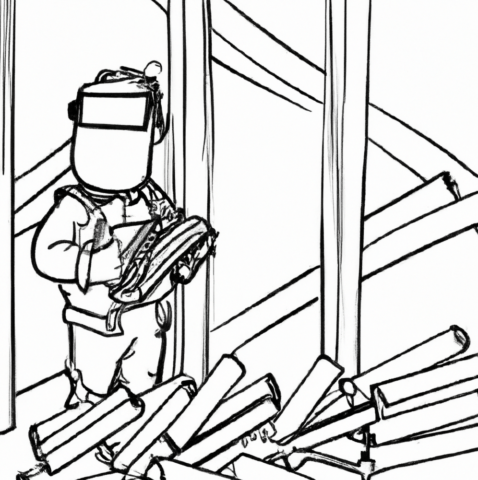As a welder, it’s important to be familiar with the different types of steel and the appropriate welding wires to use for each application. Each type of steel has unique properties and characteristics that require different welding techniques and equipment to achieve optimal results. Here’s a rundown of some common types of steel and the welding wires that are appropriate for each type.
In this guide:
Carbon Steel
Carbon steel is a type of steel that contains carbon as the primary alloying element, with a maximum carbon content of 2.1%. It is one of the most commonly used materials in welding applications, and a variety of welding wires are appropriate for use with carbon steel. ER70S-6, ER70S-3, and ER70S-2 are all popular choices for welding carbon steel, as are E71T-1, E71T-11, E6010, E6011, E6013, E7018, and E7024.
Low-Alloy Steel
Low-alloy steel is a type of steel that contains small amounts of alloying elements, such as manganese, nickel, and chromium, to improve its strength and toughness. Welding low-alloy steel requires a specific set of welding wires that are designed to work with these alloys. Some appropriate welding wires for low-alloy steel include ER80S-D2, ER80S-G, ER100S-1, E11018-M, E12018-M, E8018-B2, and E9018-B3.
High-Strength Low-Alloy (HSLA)
Steel High-strength low-alloy (HSLA) steel is a type of low-alloy steel with a minimum yield strength of 50 ksi (345 MPa). HSLA steel requires specific welding wires that are designed to work with these alloys and maintain the strength and toughness of the steel. Some appropriate welding wires for HSLA steel include ER80S-D2, ER100S-1, E11018-M, E12018-M, E8018-B2, and E9018-B3.
Stainless Steel
Stainless steel is a type of steel that contains at least 10.5% chromium, which provides good corrosion resistance and makes it suitable for use in a variety of applications. Welding stainless steel requires specific welding wires that are designed to work with the alloy and maintain its corrosion resistance. Some appropriate welding wires for stainless steel include ER308L, ER309L, ER316L, ER347, ER410, and ER2209.
Duplex Stainless
Steel Duplex stainless steel is a type of stainless steel that contains both austenitic and ferritic structures, which provides a combination of strength and corrosion resistance. Welding duplex stainless steel requires specific welding wires that are designed to work with the alloy and maintain its strength and corrosion resistance. Some appropriate welding wires for duplex stainless steel include ER2209 and ER2307.
Nickel-Based Alloys
Nickel-based alloys are alloys that contain significant amounts of nickel and are often used in high-temperature and corrosive environments. Welding nickel-based alloys requires specific welding wires that are designed to work with these alloys and maintain their strength and corrosion resistance. Some appropriate welding wires for nickel-based alloys include Inconel 625, Inconel 718, Monel 400, Hastelloy C-276, and ERNiCrMo-3.
Tool Steel
Tool steel is a type of steel used for making tools and dies, characterized by its high hardness and toughness. Welding tool steel requires specific welding wires that are designed to work with the alloy and maintain its hardness and toughness. Some appropriate welding wires for tool steel include E7018-A1, E7018-G, E7024, and E11018-M.
Cast Iron
Cast iron is a type of iron alloy with a high carbon content, often used for making engine blocks, pipes, and other heavy-duty applications. Welding cast iron requires specific welding wires that are designed to work with the alloy and maintain its strength and durability. Some appropriate welding wires for cast iron include ENiFe-CI, ENi-CI, and E6013.
Common Steel and Welding Wire Types:
| Steel Type | Appropriate Welding Wires | Example Uses |
|---|---|---|
| Carbon Steel | ER70S-6, ER70S-3, ER70S-2, E71T-1, E71T-11, E6010, E6011, E6013, E7018, E7024 | Building frames, bridges, pipelines |
| Low-Alloy Steel | ER80S-D2, ER80S-G, ER100S-1, E11018-M, E12018-M, E8018-B2, E9018-B3 | Heavy machinery, automotive manufacturing, construction projects |
| High-Strength Low-Alloy (HSLA) Steel | ER80S-D2, ER100S-1, E11018-M, E12018-M, E8018-B2, E9018-B3 | Aerospace, automotive manufacturing, military equipment |
| Stainless Steel | ER308L, ER309L, ER316L, ER347, ER410, ER2209 | Food processing equipment, medical instruments, chemical processing |
| Duplex Stainless Steel | ER2209, ER2307 | Chemical and petrochemical processing, oil and gas equipment, marine environments |
| Nickel-Based Alloys | Inconel 625, Inconel 718, Monel 400, Hastelloy C-276, ERNiCrMo-3 | Aerospace, power generation, chemical processing |
| Tool Steel | E7018-A1, E7018-G, E7024, E11018-M | Cutting tools, dies, molds |
| Cast Iron | ENiFe-CI, ENi-CI, E6013 | Automotive manufacturing, industrial machinery, architectural applications |
Choosing the right welding wire for a specific steel type is essential for achieving strong, durable welds. Welders should be familiar with the specific properties and characteristics of each type of steel and consult with a professional if they are unsure about which type of welding wire to use. It’s also important to follow the manufacturer’s instructions and use appropriate welding technique to ensure optimal weld strength and quality.




